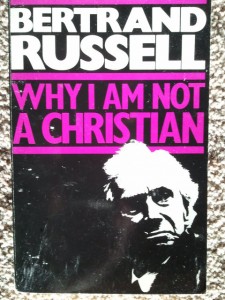When I wrote about Islam, I wrote as a confessed outsider. The same is true here, for I am no atheist. Still, I am able to observe where people disagree with atheism, especially the so-called new atheism. And I think the attacks reveal something of the beliefs of those who speak up on behalf of no god.
In other words, attacks on atheism also fit the pattern I have been pushing: that attacks for any belief will – imperfectly – match the message of that belief.
The criticisms of atheism are primarily two:
- The manner and tone of their ex cathedra* pronouncements are excessively caustic, superior and vitriolic
- Their arguments are amazingly ignorant and dismissive of the intellectual territory into which they have stumbled
Is the tone so very important? Not directly. My guess is that the tone issues directly from the (false) confidence and ignorance which is the second accusation. Since I think the tone is secondary, I also think it not worth much comment here.

Wilful ignorance, on the other hand, is definitely worth consideration. Personally, this is one of my earliest memories of engaging with atheism. As a young Christian, I read Bertrand Russell’s famous collection of essays, Why I Am Not A Christian. I still remember my reaction to his explanation, ‘Because it seems you don’t understand God, Jesus, sin, or the gospel.’
The criticism of ignorance is, of course, a generalisation. It truly applies only to some evangelists of atheism. Despite this, it’s a comment that sticks to the whole movement. I think this disturbs some within the atheist camp. For example, this is from Melvyn Bragg, on Dawkins:
It is clear that he has not studied the Bible’s effect on slavery. As a scientist he would never allow himself to be so remiss in such a comparably crucial area. So why here? It is embarrassing and raises questions about the authority and trustworthiness of other points he makes. All those other sweeping dismissals – what hard evidence does he have? How carefully is it weighed?
The Book of Books, page 206.
I can re-phrase Bragg’s question in light of my theme (that attack matches message), ‘What part of the atheist message leads to intentional ignoring other points of view?’
The answer is that many hard-line atheists are proponents of nothing-buttery.
Nothing buttery: the idea that nothing but scientific method gives truth. There is truth, but its only access point is experiment, theory, equations, and publication in a peer-reviewed scientific journal. If it cannot be known by science – at least in theory – then it cannot be known.
This is an amazing claim – and I think it entirely false – but since it is fundamental for many atheists, I can only applaud their success in announcing it and living by it.
My suggestion is that this provides a way ahead in conversation. It’s a bit of a dead-end to shout at each other (‘You are ignorant and arrogant!’). So, if there’s evidence of this ignorance, try to turn the conversation to what we can know, and how we can know it. Is science true? Is science the only truth? What options are there? How can we find criteria to decide?
* A most fitting Latin phrase, in this case. Bishops, by tradition, are installed on a seat. When they pronounce, they do so from the chair: ex cathedra. The most famous of the new atheists, Richard Dawkins, is said to have had a chair created especially for him. It’s the Charles Simonyi Chair for the Public Understanding of Science.
